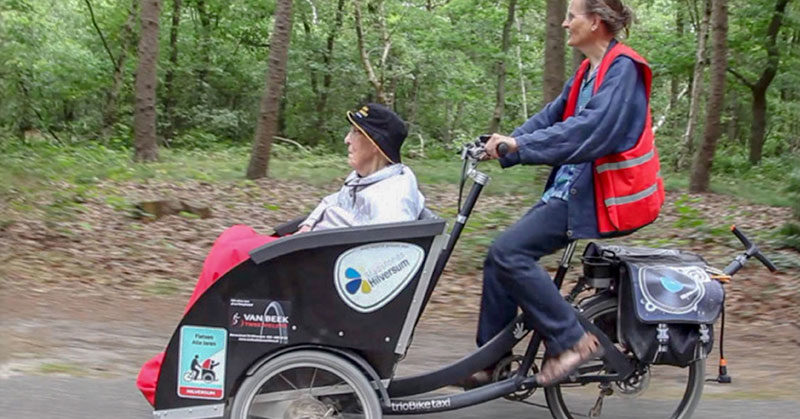Volunteers Around the World Are Taking the Elderly On Rickshaw Rides in Nature
Younger generations sometimes take for granted our capacity to travel freely and participate in a range of sports, such as biking. Furthermore, we sometimes overlook the fact that many older individuals miss practicing these activities. Cycling Without Age fills this gap by providing rickshaw trips to the elderly.
Rickshaw Rides For the Elderly
Ole Kassow, a Copenhagen resident, established Cycling Without Age in 2012. While riding his bike to work, he came up with the concept after passing an old gentleman sitting on a bench outside a nursing facility.
Kassow assumed the elderly man had a handicap and that he hadn’t ridden a bicycle in a long time. With cycling being such an integral part of Copenhagen culture, he assumed this man would miss it very much.
Kassow remembered his own father. He, like this individual, was now limited to a wheelchair and unable to enjoy bike trips as he formerly did.
Kassow stated, “I couldn’t get the notion out of my brain that I wanted to get this man back on a bike.”
He rented a rickshaw the next day and began providing rides to residents of the retirement home. His first trip was with a woman who entertained him by telling him stories about her life in Copenhagen while they toured the city. She had more vitality than ever once they’re back home.
Cycling Without Age was born because Kassow realized he’d discovered something exceptional.
Cycling Without Age
Cycling Without Age developed as additional volunteers signed up to provide rickshaw rides to the elderly in their community. In today’s globe, there are 2,200 chapters in 50 nations.
Cycling Without Age has a simple mission: to connect younger people in cities and towns with the older generation by providing rickshaw rides to enable the elderly enjoy some fresh air.
“We hope to build a future together in which access to active citizenship brings satisfaction to our senior people by allowing them to remain engaged members of society and their communities.
We accomplish this by allowing them to feel the wind in their hair, to see the city and nature up close from the perspective of a bicycle, and to tell their narrative in the setting where they have lived their life.
In this way, we strengthen trust, respect, and the social glue in our society by bridging generations.”
Rickshaw Rides Improving People’s Lives
The rickshaw trips, as Kassow and the nursing home staff witnessed with that first-ever ride, have the potential to significantly enhance people’s everyday lives. Because all of the data was anecdotal, they decided to perform a formal research.
The chapter in Singapore was used to conduct the impact research. According to the findings, travelers had the following experiences:
- 5% increase in current mood and outlook on life
- 4% increase in social connectedness and community connection
“When you take individuals who have been forgotten into their communities, they meet new people, see people they know, and it strengthens some of these smaller towns,” Kelly Talcott, CWA’s U.S. coordinator, explained. “It’s all about providing someone a fresh narrative to tell,” says the author.
Passengers aren’t the only ones that profit. Many of the same gains in social connection and sense of community are seen in the pilots. They claim that their passengers teach them a lot about life and that the elderly they transport teach them a lot.
How it Works
Volunteers who sign up to be pilots can go on as many or as few rides as they wish. Most tours are straightforward day outings, but Cycling Without Age has collaborated with nursing homes and other organizations to provide more than simply a bike ride.
Ice fishing expeditions are offered by certain chapters, such as those in Sweden and Wisconsin. Three- and four-day cycling tours are offered by some chapters. These are usually bigger groups that comprise family members of senior travelers as well as nursing facility personnel. They stay at motels, go on picnics, and participate in a variety of activities. These tours can have up to 100 people on them.
Volunteers must buy their own rickshaws, however Cycling Without Age provides tools on their Getting Started page to assist you fundraise and buy one. Volunteers in some states, such as Wisconsin and Minnesota, may be eligible for assistance to purchase rickshaws.
A Program That Benefits All
Without a doubt, rickshaw trips for the elderly provide significant advantages to all parties concerned. To find out whether your city has a chapter or to learn how to start one, check to Cycling Without Age’s website here.










